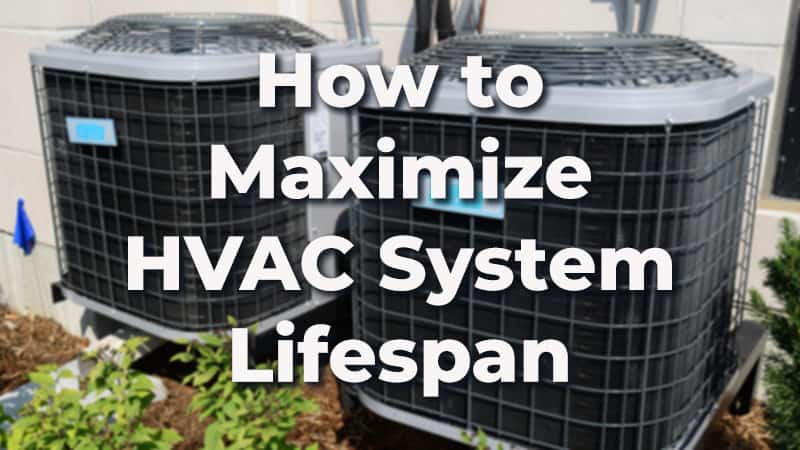It can safely be said that your HVAC system is one of the most important aspects of your home. It basically runs year-round, give or take a little bit, providing heating and cooling to keep your home as comfortable as possible even when the temperatures are at their most extreme.
But your HVAC has a lifespan to be aware of. Generally speaking, an air conditioner will last in the 12- to 15-year range while a furnace can hit two decades.
Of course, as a homeowner, you want to get as much life out of your HVAC system as possible to avoid the cost of replacement.
Why Should You Try to Extend the Life of Your HVAC System?
Whether you like to admit it or not, replacing an HVAC system is one of the more costly endeavors when it comes to homeownership. That is why you should always be looking for ways to maximize the lifespan of your HVAC system.
Sure, you are delaying the inevitable but if you can get a few extra years out of your HVAC system, this means that you will have to replace the system far less in your lifetime.
Instead of having to replace it two or three times in your lifetime, maybe you can maximize the lifespan of your HVAC system to the point where you only need to replace it once.
This is a huge cost saving, not to mention all the inconvenience that comes with a broken HVAC.
So, let’s get to the point.
Here are some tried and tested tips that will help you delay the replacement of your HVAC system by maximizing its life span. You’ll be thankful that you implemented these steps and gave extended life to your HVAC system.
Best Ways to Maximize the Lifespan of Your HVAC
1. Make Sure to Change the Filter on a Regular Basis
This is one of the easiest preventative maintenance steps that you can take to get more life out of your HVAC system. As a common practice, most homes will come equipped with a 30-day filter of some sort, although there are three-month variations available as well.
Make sure that you are checking these regularly. Far too many times, homeowners allow them to get very dirty. This can mean that they need replacing before their designated service date, which a lot of homeowners simply ignore.
What does this mean for your HVAC?
Dirty filters can significantly reduce the performance of HVAC systems as the built-up dirt and dust serve as a blockage that prevents the system from working efficiently. It leads to reduced airflow and an overworked fan. Overall, a dirty filter can greatly reduce the lifespan of the whole HVAC system if it’s left unchecked.
A good rule of thumb is to check it once a month to get an idea of what kind of condition it is in. Before replacing the filter, make sure you read the owner’s manual of your HVAC to know the exact type of filter you have to buy. When in doubt, reach out to the manufacturer: its customer service will be more than happy to answer your questions.
This is one of the simpler maintenance suggestions that can really help you get more life out of your HVAC system.
Besides extending the lifespan of your HVAC, make sure you don’t forget about maintaining your sump pump too: here you will find everything you need to know.
2. Regular Maintenance Inspections
One of the most common mistakes that people make when it comes to preserving their HVAC systems is not scheduling regular maintenance, especially when that “regular” maintenance is just twice per year.
HVAC units really don’t require much in the way of maintenance, however, if you ignore regular cleanings and tune-ups, chances are good that your HVAC will break down sooner than later and repair costs will be much higher.
If you really want to increase the lifespan of your unit, you should schedule maintenance twice a year (but at least annually). It’s one of those measures that must be taken to get the most out of your HVAC.
I suggest you have the scheduled maintenance done by experts unless you know what you’re doing. Make sure that when you call an HVAC service, they not only inspect the entire system but also remove debris and clean all parts as well.
Best practices suggest that you schedule these service visits for fall and spring so that your HVAC is ready when the extreme temperatures of summer and winter come around.
Another reason for having your maintenance scheduled for those times of year is that, should something be wrong, you can deal with it without having to worry about dealing with those extreme temperatures without an HVAC system.
A tune-up will generally include not only a complete inspection but a number of services as well, such as changing the filters, checking the condensate drain, removing clogs and debris, lubing up any moving parts, checking the electrical connections and the thermostat settings, and check if there’s enough refrigerant in the air conditioner unit.
Perhaps the most important step to a longer life for your HVAC system is through these regular maintenance visits.
3. Check the Condition of the Condenser
You likely know what it is even if you don’t know the name: the condenser, that big box that makes a lot of noise, is outside your home somewhere. Because they are outside, they are also built to withstand a consistent pounding from the elements.
This does not mean that they are impervious to damage, however. Debris and hail from major storms can absolutely damage the condenser, having a serious impact on your air conditioning.
If there has been a major storm in your area, give your condenser a quick once over to make sure that there is no serious damage. If you have a buildup of leaves or weeds, make sure to clear those out right away too.
Keep an eye on the vegetation around the condenser as well. If there is growth around the unit, you’re better off getting rid of it before it reduces the airflow around the condenser. The same is true for debris and dirt: they can significantly reduce the performance of the condenser when regular cleaning is neglected.
4. Automatic Fan Control
The fan is an essential part of your HVAC system. Whether you want to heat or cool your home, the fan should always work flawlessly. However, it does not mean that it should run all the time.
While it’s true that a constantly running fan (“on” setting) will probably remove more dust from the air (thus it can be beneficial for those who suffer from allergies), rest assured that this setup will significantly reduce the lifespan of your HVAC as the unit has to work constantly.
So what should you do if you want an increased lifespan but don’t want to give up performance?
Just look for the “auto” fan setting and use that instead of the “on” setting.
Automatic fan control only keeps the fan running while actively cooling or heating, so it saves your HVAC system from some unnecessary stress that can really add up over time.
FYI: There are some home systems that will have dual-speed fans that allow for more energy-efficient settings.
5. Check the AC Drain Line
Dirt, dust, and algae can build up in AC drain lines causing a complete or partial blockage that can reduce the performance of your system. If the drain line is clogged, it can make your AC completely stop working.
Modern HVACs come with built-in alert systems that will notify you whenever the drain line becomes clogged. It’s a really useful feature, however, if you have an older unit, all you have to do is inspect the drain line and the drain pan occasionally and remove the dirt when it’s necessary.
Cleaning the drain line is not complicated and it usually takes no more than half an hour (here is how you can do that). Maintaining the drain line is something that’s well worth the invested time and effort if you do it regularly.
6. Try Upgrading Your Insulation
A major reason why your HVAC system may need to run frequently is that your home is not properly insulated. The job of your insulation is to prevent the radiation (such as infrared) that comes from the sun from penetrating the roofing system and entering your home.
When those rays are allowed to enter, they can warm your home and make it more difficult for your HVAC system to keep the temperature regulated. This can lead to higher energy bills and it can also substantially cut down on the lifespan of your HVAC system.
Having proper insulation allows your home to stay cooler without the use of your HVAC system. Not only will you save on each energy bill but you could see substantial growth in the lifespan of your HVAC system.
Besides, if the insulation is the problem, you might wind up having to replace your HVAC system more often whereas if you took the steps to change out the insulation, you could isolate the problem and create a more effective solution.
Summary
As you can see, you have many possibilities to improve and maximize the lifespan of your HVAC system. These are just a few simple steps that you can take to get the most out of your HVAC, ensuring that your home stays at the right temperature at any time of the day or night. Avoid those expensive repairs or replacements by applying these tips right away.












